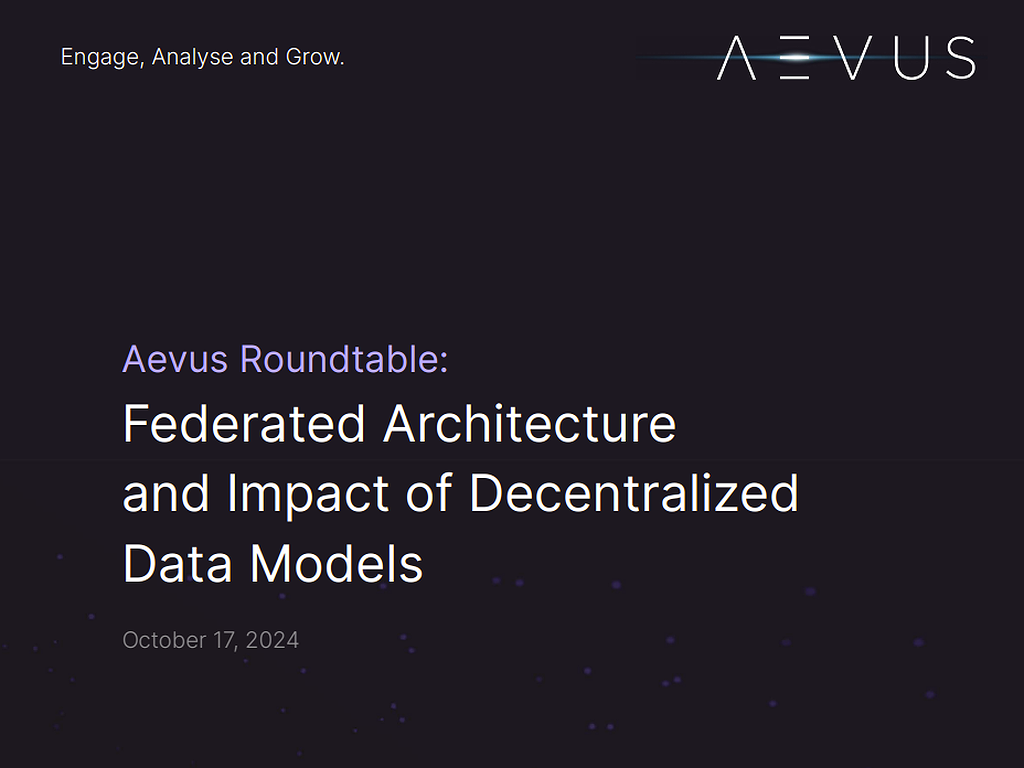
Federated Architecture and Impact of Decentralized Data Models
08 November 2024The Federated Architecture Round Table on October 17, 2024, addressed challenges in managing decentralized systems within federated organizations, focusing on scalability, chapter autonomy, and data governance. Aevus’ Communit-Us platform was introduced as a potential solution, offering tools for chapter management and data visualization to support strategic decision-making. The group highlighted the benefits of a decentralized data model for greater flexibility and scalability, proposing revenue models and strategic data management to improve integration and enable proactive, data-driven decisions across organizations.
Overview of the Federated Architecture Round Table Meeting
The Federated Architecture Round Table, held on October 17, 2024, brought together participants to discuss the challenges of managing decentralized systems within organizations, particularly with respect to chapters and portfolios. Attendees shared their concerns about scalability, the management of rogue chapters, and the complexities of handling data across different entities.
Challenges of Decentralized Data Management
A primary focus was on decentralizing data management, as centralizing data for reporting purposes often led to issues with data accuracy, accessibility, and usability. The group emphasized the need for a flexible solution that allows for decentralized data governance while maintaining autonomy at the chapter level.
Introduction of Aevus' Communit-Us Platform
Aevus introduced its Communit-Us platform as a potential solution for managing associations and chapters. It offers features such as membership management, event coordination, volunteer tracking, and resource libraries. The platform was presented as a way to address chapter autonomy while still enabling national organizations to monitor performance through integrated tools like Shiny Dashboards, which would help visualize data for strategy and decision-making.
Balancing Chapter Independence with Integration
A key concern raised was how to balance chapter independence with effective integration, especially in terms of data flow and revenue sharing.
Revenue-Generation Models for Federated Organizations
The discussion also explored potential revenue-generation models, where national organizations could charge chapters for access to technology services, turning traditionally costly operations into revenue streams. This model could reduce overhead by automating processes such as revenue sharing between chapters and national bodies.
Shifting from Reactive to Strategic Data Management
Additionally, the group discussed shifting from reactive to strategic data management, using data to predict trends, identify underperforming chapters, and make informed decisions. Real-time insights into chapter performance through Shiny Dashboards were seen as essential for this shift toward a more proactive, data-driven approach.
Benefits of a Decentralized Data Model
Finally, the meeting delved into the benefits and opportunities of a decentralized data model in federated architecture. This approach would offer greater scalability, autonomy, and customization for chapters, allowing them to use different tools and systems suited to their needs while still contributing to a shared national dataset.
Enhanced Data Governance and Risk Mitigation
The group also discussed enhanced data governance, risk mitigation through disaster recovery, and the ability to integrate third-party tools at the chapter level. Ultimately, the decentralized model enables national organizations to stay connected with their chapters, foster innovation, and optimize member engagement while reducing the risk of system-wide disruptions.
Conclusion
In conclusion, the Round Table highlighted the critical balance between empowering chapters with autonomy and ensuring cohesive data governance across federated organizations. By exploring innovative platforms like Communit-Us, federated organizations can bridge gaps in data integration, improve revenue potential, and shift toward proactive data-driven strategies. The insights gained from the discussion underscore the importance of flexibility, scalability, and tailored solutions in decentralized architecture, laying the groundwork for future advancements in federated systems management.




